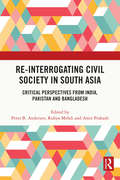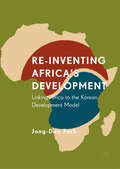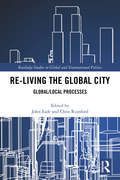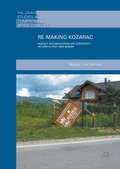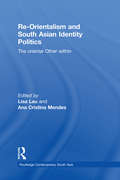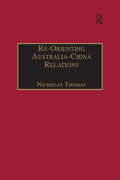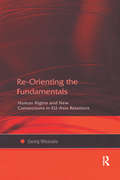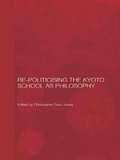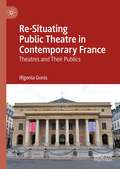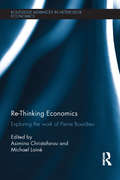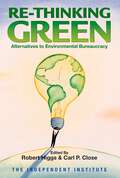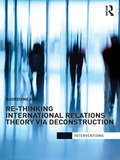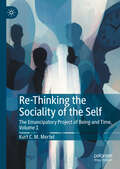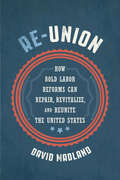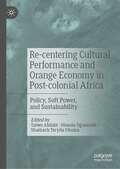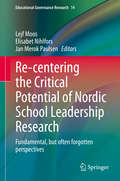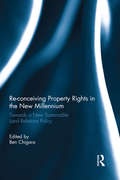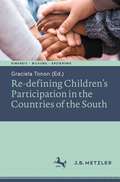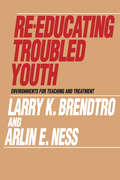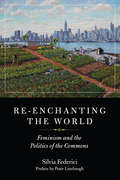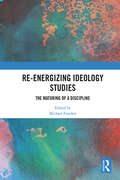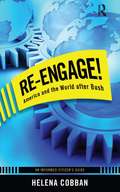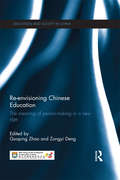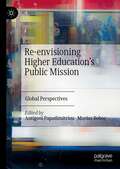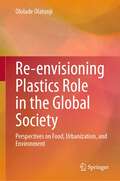- Table View
- List View
Re-Interrogating Civil Society in South Asia: Critical Perspectives from India, Pakistan and Bangladesh
by Amit Prakash Rubya Mehdi Peter B. AndersenThis book offers an overview of the history and development of civil society in three major nations of South Asia – Pakistan, India and Bangladesh – from colonial times to the present. It examines the liberalization of civil society since the 1980s, the needs it created for civil action, the professionalization of civil society organizations, and the extent to which civil society may benefit society at large in the context of local, national and global transformations in the economy, political regime and ideology. The reader will find new insights on the interaction between the liberalization of multifaceted civil societies in the three countries, presenting contrasts such as restrictions put on women’s organizations or labour unions and acceptance of religious organizations’ activities. The volume looks at forms of transfer of civil society models, representation and democratic legitimacy of civil society organizations such as nongovernmental organizations, government organized NGOs and faith-based organizations, along with the structuring of civil society through legal frames as well as female, religious, and ethnic mobilizations around language and literature. Using wide-ranging empirical data and theoretical analyses, it deals with civil society issues relating to human rights and political challenges, justice, inequality, empowerment, and the role of bureaucracy, women’s movements, and ethnic and linguistic minorities. It also presents early responses to the Covid-19 crisis in 2020 which created significant pressure on the states and on civil society. This book will be useful to scholars and researchers of political studies, development studies, sociology, public policy and governance, law and human rights, as also to professionals in think tanks, civil society activists and NGOs.
Re-Inventing Africa's Development: Linking Africa to the Korean Development Model
by Jong-Dae ParkThis open access book analyses the development problems of sub-Sahara Africa (SSA) from the eyes of a Korean diplomat with knowledge of the economic growth Korea has experienced in recent decades. The author argues that Africa's development challenges are not due to a lack of resources but a lack of management, presenting an alternative to the traditional view that Africa's problems are caused by a lack of leadership. In exploring an approach based on mind-set and nation-building, rather than unity – which tends to promote individual or party interests rather than the broader country or national interests – the author suggests new solutions for SSA's economic growth, inspired by Korea's successful economic growth model much of which is focused on industrialisation. This book will be of interest to researchers, policymakers, NGOs and governmental bodies in economics, development and politics studying Africa's economic development, and Korea's economic growth model.
Re-Living the Global City: Global/Local Processes (Routledge Studies in Global and Transnational Politics)
by John Eade Chris RumfordLiving the Global City (1996) was a landmark text in the field of Global Studies, offering an analysis of globalization and global/local processes by focussing on specific issues and themes which include community, culture, milieu, socioscapes and sociospheres, microglobalization, poverty, ethnic identity and carnival. In this new collection Eade and Rumford draw together scholars whose work has engaged with the original volume over the last 15 years and the result is a unique and thematically coherent collection of essays which both complements the original book and challenges some of its core assumptions. Re-Living the Global City both pays homage to a key text and pushes its agenda into important new areas. After reflecting upon how debates in the field have developed since the original publication, the contributors seek to drive the debate forward through discussion of contemporary themes and issues such as borders and bordering, social movements, community and global connectivity. They consider the ways in which the city produces different experiences of globalization for different people and examine the various accounts of the ways in which new forms of sociality are definitive of contemporary globalization and cosmopolitanism. Drawing together scholars from a range of disciplines including international relations, politics, sociology, urban studies and anthropology, this work will be of great interest to all students and scholars of global studies and globalization.
Re-Making Kozarac
by Sebina Sivac-BryantThis book explores agency, reconciliation and minority return within the context of ethnic cleansing in Bosnia. It focuses on a community in North-West Bosnia, which successfully reversed the worst episode of ethnic cleansing prior to Srebrenica by fighting for return, and then establishing one of the only successful examples of contested minority return in the town of Kozarac. The book is a result of a longitudinal, decade-long study of a group of people who discovered a remarkable level of agency and resilience, largely without external support, and despite many of the people and institutions who were responsible for their violent expulsion remaining in place. Re-Making Kozarac considers how a community's traumatic experiences were utilised as a motivational vehicle for return, and contrasts their pragmatic approach to local compromise with the ill-informed and largely unsuccessful international projects that try to cast them as powerless victims. Importantly, the book offers critical reflections on the interventions of the trauma and reconciliation industries, which can be more harmful than is currently realised. It will be of great interest to scholars of criminology, anthropology and international relations.
Re-Orientalism and South Asian Identity Politics: The Oriental Other Within (Routledge Contemporary South Asia Series)
by Lisa Lau Ana Cristina MendesOrientalism refers to the imitation of aspects of Eastern cultures in the West, and was devised in order to have authority over the Orient. The concept of Re-Orientalism maintains the divide between the Orient and the West. However, where Orientalism is based on how the West constructs the East, Re-Orientalism is grounded on how the cultural East comes to terms with an orientalised East. This book explores various new forms, objects and modes of circulation that sustain this renovated form of Orientalism in South Asian culture. The contributors identify and engage with recent debates about postcolonial South Asian identity politics, discussing a range of different texts and films such as The White Tiger, Bride & Prejudice and Kama Sutra: A Tale of Love. Providing new theoretical insights from the areas of literature, film studies and cultural and discourse analysis, this book is an stimulating read for students and scholars interested in South Asian culture, postcolonial studies and identity politics.
Re-Orienting Australia-China Relations: 1972 to the Present
by Nicholas ThomasDrawing on contributors from academic and policy communities, this volume explores the major aspects of Australia-China relations. The frequently overlooked connection between Australia and Taiwan is also considered to allow readers to reach a full appreciation of the restraints engendered by the relationship with China as well as its many benefits. Moving beyond the traditional state-centric analysis, the work incorporates new material on sub-state relations as well as examining the impact of global economic and social forces on the Australia-China friendship. In addition to providing a contemporary understanding of the bilateral ties, this work also provides a benchmark against which Australia's other relations with the countries of East Asia can be measured.
Re-Orienting the Fundamentals: Human Rights and New Connections in EU-Asia Relations
by Georg WiessalaOffering an investigation of the ways in which matters of human rights give shape to the European Union's interaction with Asia, this volume argues for the consideration of selected social-constructivist perspectives with regard to the Asia-EU dialogue. It puts into context the function of ideas, identities, values, norms and human rights. Through a number of country-specific and regional case studies, the text examines both the 'enabling' and the 'inhibitory' potential of human rights in the Union's relations with Asian interlocutors. The book proposes a more inclusive, holistic understanding of the significance and potential of the human rights discourse in East-West contacts. It is aimed at a wide readership from the disciplines of politics, international relations, Asian studies, law and human rights.
Re-Politicising the Kyoto School as Philosophy (Routledge/Leiden Series in Modern East Asian Politics, History and Media)
by Christopher Goto-JonesIn Re-Politicising the Kyoto School as Philosophy Christopher Goto-Jones contends that existing approaches to the controversial Kyoto School fail to take it seriously as a school of philosophy, instead focussing on historical debates about the alleged complicity of the School’s members with the imperialist regime in Japan. The essays in this book take a new approach to the subject, engaging substantially with the philosophical texts of members of the Kyoto School, and demonstrating that the school developed serious and sophisticated positions on many of the perennial questions that lie at the heart of political philosophy. These positions are innovative and fresh, and are of value to political philosophy today, as well as to intellectual historians of Japan. In particular, the book is structured around the various ways in which we might locate the Kyoto School in mainstream traditions of political thought, and the insights offered by the School about the core concepts in political philosophy. In this way the book re-politicises the Kyoto School. With chapters written by many leading scholars in the field, and representing a contribution to political thought as well as the intellectual history of Japan, this book will appeal to students and scholars of Japanese studies, philosophy and political thought.
Re-Situating Public Theatre in Contemporary France: Theatres and Their Publics
by Ifigenia GonisThis book examines the dynamics of the relational and spatial politics of contemporary French theatrical production, with a focus on four theatres in the Greater Paris region. It situates these dynamics within the intersection of the histories of the public theatre and theatre decentralization in France, and the dialogues between live performances and the larger frameworks of artistic direction and programming as well as various imaginations of the “public”. Understanding these phenomena, as well as the politics that underscore them, is key to understanding not only the present status of the public theatre in France, but also how theatre as a publicly funded institution interacts with the notion of the plurality, rather than the homogeneity, of its publics.
Re-Thinking Economics: Exploring the Work of Pierre Bourdieu (Routledge Advances in Heterodox Economics)
by Asimina Christoforou Michael LainéOnce again, unfettered capitalism has failed. Promises for global prosperity and peace have given way to a world of deep recession, social upheaval and political instability. Once again, mainstream economics has proved its inadequacy. Despite its technical rigour and mathematical virtuosity, it failed dramatically to respond to the current crisis. Why is this so? Mainstream economics turns a blind eye to society. By assumption, it maims its analyses by wiping away what makes us what we are. There is pressing need for a critical discussion and new ideas. We therefore turn to the insightful and stimulating work of Pierre Bourdieu. Arguably one of the major sociologists ever, he was also a major ‘economist’. Yet his works on the economy have received only scant attention, especially from economists, be they ‘mainstream’ or ‘heterodox’. Bourdieu helps to take a broader view and enrich our scientific imagination. By including dimensions of power, intuitive behaviour and social structures within the scope of his analysis, he provides for an alternative foundation of economics, based on an integrated, interdisciplinary theory. For the first time, this volume fills this gap in economics by featuring state-of-the-art research and experts from different social science disciplines. This book constitutes a first step, and hopes to become a milestone. The book offers an innovative outlook and a unique source for social scientists of all fields, particularly economists and sociologists, who wish to engage in the study of Bourdieu and his economics with a view to developing a more pertinent theory. It will also constitute a useful reference for university students and administrators who would like to explore the economy from a Bourdieusian perspective.
Re-Thinking Green: Alternatives to Environmental Bureaucracy
by Robert HiggsEnvironmental quality has been a major public concern since the first Earth Day in 1970, yet the maze of environmental laws and regulations enacted since then has fostered huge government bureaucracies better known for waste and failure than for innovation and success.Can we do better than this failed environmental bureaucracy? The noted contributors to this volume answer with a resounding "yes." Re-Thinking Green exposes the myths that have contributed to failed environmental policies and proposes bold alternatives that recognize the power of incentives and the limitations of political and regulatory processes. It addresses some of the most hotly debated environmental issues and shows how entrepreneurship and property rights can be utilized to promote environmental quality and economic growth. Re-Thinking Green will challenge readers with new paradigms for resolving environmental problems, stimulate discussion on how best to "humanize" environmental policy, and inspire policymakers to seek effective alternatives to environmental bureaucracy.
Re-Thinking International Relations Theory via Deconstruction (Interventions)
by Badredine ArfiInternational Relations (IR) theorists have ceaselessly sought to understand, explain, and transform the experienced reality of international politics. Running through all these attempts is a persistent, yet unquestioned, quest by theorists to develop strategies to eliminate or reduce the antinomies, contradictions, paradoxes, dilemmas, and inconsistencies dogging their approaches. A serious critical assessment of the logic behind these strategies is however lacking. This new work addresses this issue by seeking to reformulate IR theory in an original way. Arfi begins by providing a thorough critique of leading contemporary IR theories, including pragmatism, critical/scientific realism, rationalism, neo-liberal institutionalism and social-constructivism, and then moves on to strengthen and go beyond the valuable contributions of each approach by employing the logic of deconstruction pioneered by Derrida to explicate the consequences of taking into account the dilemmas and inconsistencies of these theories. The book demonstrates that the logic of deconstruction is resourceful and rigorous in its questioning of the presuppositions of prevailing IR approaches, and argues that relying on deconstruction leads to richer and more powerfully insightful pluralist IR theories and is an invaluable resource for taking IR theory beyond currently paralyzing ‘wars of paradigms’. Questioning universally accepted presuppositions in existing theories, this book provides an innovative and exciting contribution to the field, and will be of great interest to scholars of international relations theory, critical theory and international relations.
Re-Thinking the Sociality of the Self: The Emancipatory Project of Being and Time, Volume 1
by Kurt C. MertelThis book is the first in a two-volume project that provides a social-philosophical interpretation of Martin Heidegger&’s Being and Time as an emancipatory enterprise by arguing that fundamental ontology is essentially animated by an intent shared with critical theory, viz. to make philosophy concrete for the sake of individual and collective freedom. Focused on Division One of Being and Time, this volume argues that the possibilities of individual emancipation and self-actualization are inextricably bound to their environmental and intersubjective preconditions. An adequate ontology of the self, therefore, is possible only as a social ontology. To fulfill the emancipatory aims of fundamental ontology, however, it is necessary to show that the fact that agents are always already appropriated by society does not preclude the possibility of authentic self-appropriation. Hence, this volume critically reconstructs the core commitments of the &‘appropriative approach&’ to social ontology and distinguishes between the foundational and incidental aspects of fundamental ontology. The final part is devoted to addressing important criticisms of Being and Time that have impeded a fruitful dialogue between fundamental ontology and critical theory to clear the ground for a fresh re-appraisal of the former as an emancipatory project.
Re-Union: How Bold Labor Reforms Can Repair, Revitalize, and Reunite the United States
by David MadlandIn Re-Union, David Madland explores how labor unions are essential to all workers. Yet, union systems are badly flawed and in need of rapid changes for reform. Madland's multilayered analysis presents a solution—a model to replace the existing firm-based collective bargaining with a larger, industry-scale bargaining method coupled with powerful incentives for union membership.These changes would represent a remarkable shift from the norm, but would be based on lessons from other countries, US history and current policy in several cities and states. In outlining the shift, Madland details how these proposals might mend the broken economic and political systems in the United States. He also uses three examples from Britain, Canada, and Australia to explore what there is yet to learn about this new system in other developed nations. Madland's practical advice in Re-Union extends to a proposal for how to implement the changes necessary to shift the current paradigm. This powerful call to action speaks directly to the workers affected by these policies—the very people seeking to have their voices recognized in a system that attempts to silence them.
Re-centering Cultural Performance and Orange Economy in Post-colonial Africa: Policy, Soft Power, and Sustainability
by Taiwo Afolabi Olusola Ogunnubi Shadrach Teryila UkumaThis book explores the role of national theatres, national cultural centres, cultural policy, festivals, and the film industry as creative and cultural performances hubs for exercising soft power and cultural diplomacy. It shows how can existing cultural and non-cultural infrastructures, sometimes referred to as the Orange Economy, open opportunities for diplomacy and soft power; ways by which cultural performance and creative practice can be re-centered in post-colonial Africa and in post-global pandemic era; and existing structures that cultural performers, diplomats, administrators, cultural entrepreneurs, and managers can leverage to re-enact cultural performance and creative practice on the continent. This volume is positioned within postcolonial discourse to amplify narratives, experiences and realities that are anti-oppressive especially within critical discourse.
Re-centering the Critical Potential of Nordic School Leadership Research: Fundamental, but often forgotten perspectives (Educational Governance Research #14)
by Lejf Moos Jan Merok Paulsen Elisabet NihlforsThis volume contributes significantly to the ongoing international and Nordic paradigm shift in educational leadership research. It advocates for going from a contemporary, mainstream functionalist paradigm to a reflexive paradigm, based on educational values and knowledge. The volume is built on the shared basis, that the purpose of education is, and must be, fundamental for school leadership practice. However, that is often forgotten in educational governance and policy. The basis of the argument is, that educational leadership needs to change from focusing on effectiveness and narrowly defined accountability towards focusing on leadership that is contributing to the general education of students. That entails that leadership research need to focus on complex perspectives like context, relations, trust, sense making and social and human values, and less on control, outcomes, accountability and testing. The volume reminds readers about the need to raise awareness of the contexts of education and research, be they political, cultural, economic or ideological. Chapters analyze, discuss and compare research from Nordic educational leadership research systems: Denmark, Finland, Iceland, Norway and Sweden. The cross-system insights clarify the fundamental relations between policy/governance and research/practice are and discuss forgotten dependencies and opportunities.
Re-conceiving Property Rights in the New Millennium: Towards a New Sustainable Land Relations Policy
by Ben ChigaraThis book constitutes volume two of a two volume examination of development community land issues in Southern Africa. Following from volume one Southern African Development Community Land Issues, this book considers the possibility of a new, sustainable land relations policy for Southern African Development Community States (SADC) that are currently mired up in land disputes that have become subject of domestic, regional and international tribunals. Chigara demonstrates that land relations in the SADC have always been, and will perhaps remain, a matter for constitutional regulation. Because constitutional laws are distinctive from other laws only by constitutional design, legal contests appear to be the least likely means for settlement in the sub-region. Only human rights inspired policies, that respond to the call for social justice by acknowledging both the current and the underlying contexts to the disputes, hold the most potential to resolve these disputes. The book recommends efficient pedagogical counter-apartheid-rule psychological distortions regarding the significance of human dignity (PECAPDISH) as a pre-requisite and corollary to the dismantling of the salient physical legacy of apartheid-rule in affected SADC States. The book shows that PECAPDISH’s potential and benefits would be enormous. The book will be of interest to students and researchers of Property and Conveyancing Law, Human Rights Law, and Land Law.
Re-defining Children’s Participation in the Countries of the South (Kindheit – Bildung – Erziehung. Philosophische Perspektiven)
by Graciela TononThe focus of this book is centered on the participation of children in countries of the South. In this sense, it will review the possibilities of children's participation, as well as their forms of participation in different contexts of daily life. There has been a tendency to underestimate children’s role as active constructors of their surrounding social space, as well as of the internalized interpretations of the way social life operates. Today it is necessary to recognize that children are agents actively involved in the construction of their own lives and the life of the societies they live in; and in this sense, it is important to consider and re-signify the participation of boys and girls as a fundamental pillar in the process of building societies in the 21st century. The book contains chapters that re-significate children’s participation in different countries from South America and South Africa, in relation with different topics: well-being, methods, citizenship, poverty, education, rurality, ethics and human rights.
Re-educating Troubled Youth
by Alexis de TocquevilleThis book is about helping troubled young people who are searching separately for security, identity, and purpose in their lives. Childhood and adolescence are pivotal stages in the quest to belong, to become somebody, and to be worth something. Children need stimulation, affection, and guidance in order to develop their potentials, but many are reared in environments that deprive them of these nutriments. Adolescents approach the threshold of independence with only the experiences gained from childhood; many lack the support of significant actions. Those who encounter difficulty in navigating through these turbulent years are to be identified by society as troubled or troublesome. These children and youth present challenges that do not yield to simple panaceas. Although no simple approach holds all the answers, bridging various concepts of education and treatment offers the best opportunity for creating positive changes. The authors refer to this process as -re-education- with full awareness that this term has been used in a variety of philosophical contexts including behavioral, ecological, and psychodynamic views.
Re-enchanting the World: Feminism and the Politics of the Commons
by Silvia FedericiDrawing on rich historical research, Silvia Federici maps the connections between the previous forms of enclosure that occurred with the birth of capitalism and the destruction of the commons and the “new enclosures” at the heart of the present phase of global capitalist accumulation. Considering the commons from a feminist perspective, this collection centers on women and reproductive work as crucial to both our economic survival and the construction of a world free from the hierarchies and divisions capital has planted in the body of the world proletariat. Federici is clear that the commons should not be understood as happy islands in a sea of exploitative relations but rather autonomous spaces from which to challenge the existing capitalist organization of life and labour.
Re-energizing Ideology Studies: The maturing of a discipline
by Michael FreedenIdeology studies have undergone significant growth over the past couple of decades. The scope of the discipline has been extensively broadened to include not only text and discourse but emotions, imagination, fantasy, rhetoric and visual forms. Its attention to detail and to the micro-manifestations of ideology in the everyday have borne considerable fruit, particularly at a time of ideological fragmentation and reassembly. Its research methods have been refined, embracing both conceptual innovation and empirical evidence drawn from many fields of social creativity. During that period, the Journal of Political Ideologies has been a major vehicle of the discipline’s advance and coming of age. The chapters in this book originally published as two special issues in the Journal. The book assembles and investigates some of the latest approaches and domains in which cutting-edge ideology-research is now under way. The multiple topics, sources and interdisciplinary perspectives it contains illustrate the variety and depth that ideology studies have attained. Its subjects range from historical and literary analyses, through feminist studies, and psycho-social interpretations. It takes in the new means of dissemination that the digital age has introduced, and offers fresh assessments of the many cross-fertilizations possible between ideology research, political theory, and international studies, as traditional ideologies vie with new ideological articulations and forms.
Re-engage!: An Informed Citizen's Guide
by Helena CobbanA veteran international journalist gives us a concise, readable guide that provides a new vision for the United States in the global community. Since 9/11, the United States has pursued a foreign policy some have called a "control paradigm"-a unilateral domination of world affairs through military means that tries to keep the lid on insecurity without addressing root causes or protecting human rights. The Bush administration's energetic use of this approach has ripped the fabric of America's relationship with the rest of the world. In this concise guide, veteran journalist Helena Cobban proposes moving the United States away from the control paradigm to a policy of global inclusion. Global inclusion seeks to repair the U.S. relationship with other countries, recommit the United States to effective participation in the United Nations and other multilateral institutions, and ground U.S. foreign policy firmly in the principle of human equality. It also involves moving away from the language of threats and fear to a language of challenge and possibility. This book outlines how a global inclusion policy would address key challenges faced not only by Americans but by the 95 percent of humanity who are not Americans: - Challenges of terrorism and weapons proliferation. - Growing global inequality. - Rights abuses worldwide. - Climate change. - Shifting international power balances. Cobban reminds readers we do not need to do any of these things alone. Since 9/11, she has traveled to 18 foreign countries on four continents. She has heard how deep the desire is among people in China, sub-Saharan Africa, the Muslim world, Europe, and elsewhere for the United States to rejoin the world community on a sound and cooperative basis. In heartfelt, accessible prose with highly readable tables, graphics, websites, and other resources, she shows how we can re-engage as neighbors, as a country, and as a trusted international partner.
Re-envisioning Chinese Education: The meaning of person-making in a new age (Education and Society in China)
by Zongyi Deng Guoping ZhaoMaintaining education as a pedagogical space for human formation, this book is distinctive in looking at the crisis rather than the success of Chinese education. The editors and contributors, mostly overseas and mainland Chinese scholars, argue that modern Chinese education has been built upon a superficial and instrumental embrace of Western modernity and a fragmented appropriation of Chinese cultural heritage. They call for a rethinking and re-envisioning of Chinese education, grounded in and enriched by various cultural traditions and cross-cultural dialogues. Drawing on Chinese history and culture, Western and Chinese philosophies, curriculum and pedagogical theories, the collected volume analyzes (1) why education as person-making has failed to take root in contemporary China, (2) how the purpose of education has changed during the process of China’s modernization, and (3) what a rediscovery of the meaning of person-making implies for rethinking and re-envisioning Chinese education in the current age of globalization and social change. Re-envisioning Chinese Education: The meaning of person-making in a new age discusses among other issues: China’s Historical Encounter with the West and Modern Chinese Education Rediscover Lasting Values: Confucian Cultural Learning Models in the Twenty-first Century Rethinking and Re-envisioning Chinese Didactics: Implications from the German Didaktik Tradition The New Basic Education and the Development of Human Subjectivity: A Chinese Experience This book will be relevant for scholars, researchers, and policy makers everywhere who seek a more balanced, more sophisticated, and philosophically better grounded understanding of Chinese education.
Re-envisioning Higher Education’s Public Mission: Global Perspectives
by Antigoni Papadimitriou Marius BobocThis book covers initiatives related to higher education’s public mission such as university-community engagement, knowledge transfer, economic development, and social responsibility, using empirical and conceptual cases in the US, South America, Europe, Africa, and Asia. In order to develop a better understanding of public mission initiatives in higher education across the globe, the volume editors developed a theoretical framework emerging from organizational theory. Each chapter analysis uses both external environmental elements (political, economic, sociocultural, and technological), as well as internal institutional elements (mission, vision, leadership, and governance). Finally, each chapter highlights issues related to implementation and challenges with the intent of prompting readers to consider appropriate ways in which to adopt some of the lessons learned by the contributing authors.
Re-envisioning Plastics Role in the Global Society: Perspectives on Food, Urbanization, and Environment
by Ololade OlatunjiThis book covers the challenges and opportunities presented by plastics in the modern era and sheds light on the complex interplay of technology, environment, and socio-economic dynamics. With a thorough exploration of the history, uses, and potential of plastics, the book reviews the impact of plastics beyond single-use plastics, and critiques multiple long-term plastic applications that are significant for food security, water resource management, ecological conservation/restoration, and sustainable urbanization. It also explores frameworks for achieving a more sustainable plastic economy aligned with sustainable development goals. This book comprises 13 chapters, commencing with a critical assessment of plastics in the context of sustainable development and global society. It proceeds with a historical overview of plastics' evolution, showcasing pivotal milestones and innovations in modern industry and daily life. Subsequent chapters delve into diverse topics: the intricate relationships between plastics, food security, and sustainable urbanization; plastics' impact on water safety, management, distribution, and conservation; their potential as an alternative energy source; and their innovative applications in sustainable transportation and energy generation. Emphasis is placed on plastics' role in waste reduction and recycling, as well as the latest sustainable alternatives like biodegradable and recyclable materials. In the book's final sections, readers will learn about green buildings and climate-resilient cities constructed using innovative plastic materials, and plastics' significance in space exploration. The book concludes with a forward-looking perspective on plastics' future, accompanied by recommendations for a more sustainable coexistence between society and these versatile materials. This book is a valuable resource for researchers, policymakers, industry professionals, and concerned citizens seeking to navigate the intricate landscape of plastics, their environmental implications, and their potential for sustainable development.
